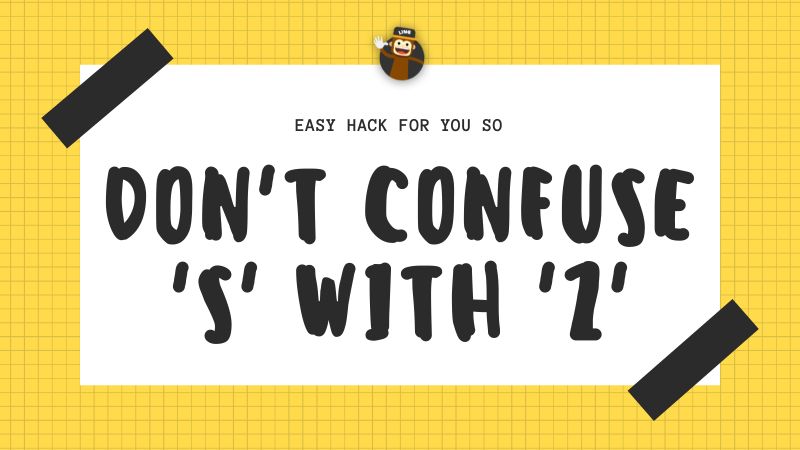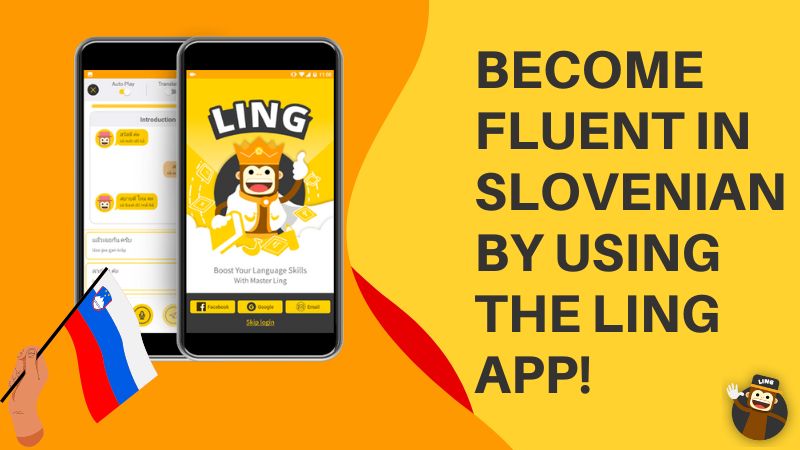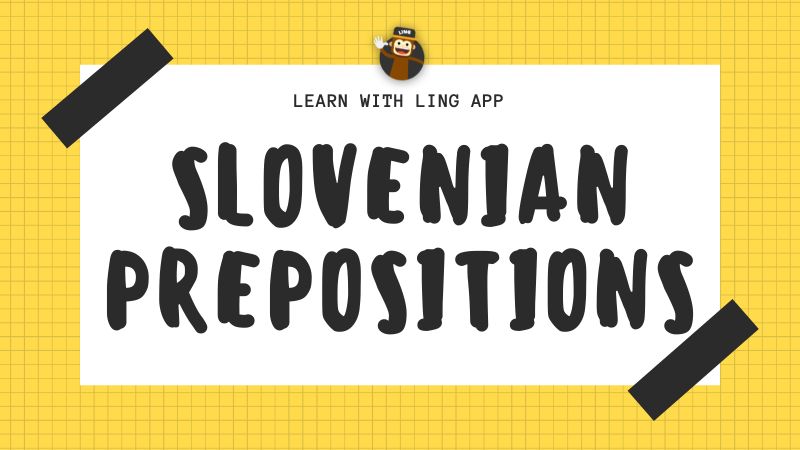Prepositions are one of the essential elements of any language and its grammar, yet they can be some of the most difficult ones to learn. Slovenian prepositions are no exception to this. In this blog post, we will discuss some of the most typical Slovenian prepositions and how to use them correctly so that you can build confidence in using them in your own sentences. With some practice, you’ll be using Slovenian prepositions like a pro!
Slovenian Grammar
Slovenian is a Slavic language spoken by about 2.5 million people, primarily in Slovenia, where it is the official language. Like other Slavic languages, Slovenian uses a lot of demonstrative pronouns and has a complex system of personal pronouns.
It also has a rich vocabulary of phrases and nouns. Compared to other Slavic languages, Slovenian is relatively easy to learn for those who speak French, partly due to its use of Latinate words and loanwords from German.
Slovene Prepositions
Let’s look at an epic list of the Slovenian prepositions, which are an ultimate must for you to know if you want to make sentences like native speakers.
A-I
| English | Slovenian | English | Slovenian |
| about | približno | but | ampak |
| above | zgoraj | by | avtor |
| according to | po navedbah | close to | blizu |
| across | čez | despite | Kljub |
| after | po | down | navzdol |
| against | proti | due to | zaradi |
| among | med | during | med |
| around | okoli | except | razen |
| as | kot | except for | razen |
| as far as | dokler | far from | daleč od |
| as well as | tako dobro, kot | for | za |
| at | pri | from | od |
| because of | zaradi | in | v |
| before | prej | in addition to | poleg |
| behind | zadaj | in front of | pred |
| below | spodaj | in spite of | kljub |
| beneath | spodaj | inside | znotraj |
| beside | poleg | inside of | znotraj |
| between | med | instead of | namesto |
| beyond | onstran | into | v |
N-W
| English | Slovenian | English | Slovenian |
| near | blizu | since | od |
| near to | blizu | than | kot |
| next | Naslednji | three words | tri besede |
| next to | zraven | through | skozi |
| of | od | till | do |
| on | na | to | do |
| on behalf of | v imenu | toward | proti |
| on top of | na vrhu | two words | dve besedi |
| opposite | nasprotje | under | Spodaj |
| out | ven | unlike | za razliko od |
| outside | zunaj | until | dokler |
| outside of | zunaj | up | gor |
| over | čez | via | prek |
| per | per | with | z |
| plus | plus | within | znotraj |
| prior to | pred | without | brez |
| round | krog |
Usage Of Slovenian Prepositions
In Slovenian, prepositions are always placed before Slovenian verbs, often changing form depending on the verb’s tense.
Adverbs are also frequently used as prepositions, which can be either masculine or feminine.
When translating Slovenian sentences into English, it is essential to remember that interrogative words are often used as prepositions.
Lastly, remember that the accusative case is used for direct objects of verbs (such as “I see the man”), while the nominative case is used for subjects of verbs (such as “The man sees me”).
No matter what language you’re trying to learn, prepositions can be tricky, and Slovenian prepositions are no exception. To understand how to use them, let’s look at some examples.
Use Of Pred
The preposition “pred” means “in front of/before.” Let’s look at some helpful sentences while breaking them down.
- There is a cat in front of the house. (Je mačka pred hišo.)
- I put my jacket on the chair in front of the door. (Položil sem jakno na stol pred vrati.)
- The cat is lying in front of the stove. (Mačka leži pred žarom.)
Helpful Glossary
| English | Slovenian |
| A cat | Mačka |
| A chair | Stol |
| A jacket | Jakno |
| Before | Pred |
| Bring it back | Vrati |
| Grill | Žarom |
| I am | Sem |
| It is | Je |
| Lie down | Leži |
| On | Na |
| Placed | Položil |
| The house | Hišo |
Use Of Pod
The preposition “pod” means “under.” Let’s look at some examples:
- The cat is hiding under the bed. (Mačka se skriva pod posteljo.)
- Let’s put the table under the tree. (Ponesimo mizo pod drevo.)
- I left my bag under the desk. (Pustil sem torbo pod pisalno mizo.)
Use Of Iz
The preposition “is” means “out of.” Here are some examples for you:
- He took the book out of his backpack. (Vzela je knjigo iz nahrbtnika.)
- She poured water out of the vase. (Iz vaze je odlila vodo.)
- We took the vegetables out of the fridge. (Iz hladilnika smo vzeli zelenjavo.)
Confusing ‘S’ With ‘Z’

If you are learning the Slovenian prepositions and you often confuse ‘s’ with ‘z’, then don’t worry since many people do that. Some consonants work well with ‘s,’ and some are cool with ‘z.’
T, S, H, Š, K, F, C, P, Š, and Č are consonants that require using the Slovenian preposition ‘s.’ The rest of the Slovenian alphabets can be written using the preposition ‘z.’
Let’s look at an example of each alphabet.
| English | Slovenian | Alphabets | English | Slovenian | Alphabets |
| With Alphabet | Z Abecedo | A | With House | S Hišo | H |
| With Ball | Z Žogo | Ž | With Ireland | Z Irsko | I |
| With Balloon | Z Balonom | B | With Lasagna | Z Lazanjo | L |
| With Camera | S Kamero | K | With Mom | Z Mamo | M |
| With Chocolate | S Čokolado | Č | With Movie | S Filmom | F |
| With Coast | Z Obalo | O | With Sandwich | S Sendvičem | S |
| With Duck | Z Raco | R | With School | S Šolo | Š |
| With Electricity | Z Elektriko | E | With Slippers | S Copati | C |
| With Friend | S Prijateljem | P | With Telephone | S Telefonom | T |
| With Gift | Z Darilom | D | With Weather | Z Vremenom | V |
| With Gondola | Z Gondolo | G | With Yogurt | Z Jogurtom | J |
| With Hour | Z Uro | U | With Zebra | Z Zebro | Z |
General Sentences
Finally, look at some of the most common sentences you must know if you are trying to learn Slovenian prepositions.
| English | Slovenian |
| Considering this matter, I think you need some space. | Glede na to zadevo mislim, da potrebujete nekaj prostora. |
| Go into your room. | Pojdi v svojo sobo. |
| Go without me. | Pojdi brez mene. |
| He is in front of the market. | Pred tržnico je. |
| I don’t know anything concerning this issue | O tem vprašanju ne vem ničesar |
| I need this within the next five minutes | To potrebujem v naslednjih petih minutah |
| In spite of the warning, you did that. | Kljub opozorilu ste to storili. |
| Need solution regarding this problem. | Potrebujete rešitev v zvezi s to težavo. |
| On behalf of my dad, I am throwing this wedding party. | V imenu mojega očeta prirejam to poročno zabavo. |
| Place this upon the table. | Postavite to na mizo. |
| Six out of ten. | Šest od desetih. |
| The bedroom is next to the bathroom. | Spalnica je poleg kopalnice. |
| This matter is getting worse, given that you don’t care. | Ta zadeva postaja vse hujša glede na to, da vam je vseeno. |
| This road is closed according to my information | Ta cesta je po mojih informacijah zaprta |
| We are dying, including you. | Umiramo, vključno z vami. |
| We are in the middle of a crisis. | Smo sredi krize. |
| We start laughing during the fight. | Med prepirom se začnemo smejati. |
| You can find him across from this street | Najdete ga nasproti te ulice |
| You did not solve the matter provided that we had less time | Zadeve niste rešili pod pogojem, da smo imeli manj časa |
| You need to take the cat out from beneath | Mačko morate vzeti ven |
Wrapping Up

That’s it for this blog post. If you are interested in learning the Slovenian language, then we cannot suggest that any app is better than the Ling App.
On Ling App, you can learn Slovenian along with sixty other languages. An avid language learner has a weakness that they cannot stick to one language only. They keep switching between the languages, which is an excellent approach since it gives you a well-deserved break and helps you connect several languages.
You can easily switch between different languages on Ling App, and guess what? Your progress will be saved. Also, check out how to say congratulations in Slovenian and Spaceship Related Slovenian Vocab.
Ling App is like a multi-sectioned binder where you can keep all your documents separately but organized in one place. In that same sense, Ling App has everything you’ll need to start learning Slovenian and 60+ other languages! What are you waiting for? Download the Ling App from Google Play Store or App Store and start learning the Slovenian language.

















